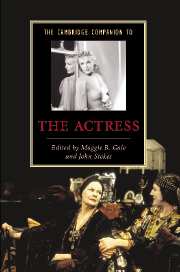Book contents
- Frontmatter
- Introduction
- Part I Turning points
- Part II Professional opportunities
- 8 The actress as manager
- 9 By herself: the actress and autobiography, 1755-1939
- 10 The screen actress from silence to sound
- 11 Side doors and service elevators: racial constraints for actresses of colour
- Part III Genre, form and tradition
- General reading
- Index
11 - Side doors and service elevators: racial constraints for actresses of colour
from Part II - Professional opportunities
Published online by Cambridge University Press: 28 November 2008
- Frontmatter
- Introduction
- Part I Turning points
- Part II Professional opportunities
- 8 The actress as manager
- 9 By herself: the actress and autobiography, 1755-1939
- 10 The screen actress from silence to sound
- 11 Side doors and service elevators: racial constraints for actresses of colour
- Part III Genre, form and tradition
- General reading
- Index
Summary
“This moment is so much bigger than me. This moment is for Dorothy Dandridge, Lena Horne, Diahann Carroll. It's for the women that stand beside me - Jada Pinkett, Angela Bassett, Vivica Fox - and it's for every nameless, faceless woman of color that now has a chance because this door tonight has been opened.” Halle Berry, Oscar acceptance speech, 2002 / When Halle Berry won the Best Actress in a Leading Role Academy Award for Monster's Ball (2001), she dedicated her Oscar to the African American actresses who had come before her, whose struggles, activism and perseverance had helped to pave the way for her own success. Berry's award (the first given to a leading black woman in the seventy-four-year history of the Oscar) was held to be deeply significant in marking a professional development for black actresses and a progressive narrative of racial discourses. Almost fifty years earlier, Dorothy Dandridge had been the first black woman to be nominated in the Best Actress category for the role of Carmen in Otto Preminger's film version of Bizet's opera Carmen Jones (1954). But whereas Dandridge's success had been against the odds - a 'Negro' woman in a white man's world - Berry belongs to a supposedly integrated society where black women are said to have the same opportunities as everyone else. Berry's Oscar seemed to mark a progression from times past, when black actresses were either absent from stage and screen or played minor or racially typecast supporting parts as mammies, matriarchs, Jezebels or tragic mulattoes. In the 1940s, 1950s and 1960s Louise Beavers, Hattie McDaniel and Ethel Waters were subjected to the wrath of the National Association for the Advancement of Colored People (NAACP - founded 1910) for accepting roles as maids and servants that were thought to perpetuate racial stereotypes of black women, whereas Berry appears to be part of a generation where casting is no longer based primarily on associations with a particular skin colour, but is made on the basis of acting 'talent'.
- Type
- Chapter
- Information
- The Cambridge Companion to the Actress , pp. 215 - 232Publisher: Cambridge University PressPrint publication year: 2007



